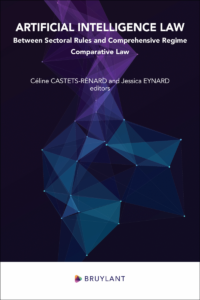Artificial intelligence technologies are spreading across all aspects of social life: from automated decision-making tools used by administrations to facial recognition, personal assistants, recruitment software, and medical diagnostic aids, no sector of activity escapes their deployment. While the benefits of these tools are undeniable, they also entail risks of errors, biases (related to gender, race, disability, etc.), discrimination, invisibility, and exclusion. The law can address these new ethical and socio-economic challenges. In different parts of the world, legislators are thus considering the need (or not) to create a legal framework and how to do so.
The artificial intelligence law is an emerging field of research, and this pioneering book aims to constitute a first step in its conception. It brings together around forty authors from different parts of the word: Canada, France, Belgium, the United States, Brazil, Mexico, Senegal. Without claiming to be exhaustive, it allows for indicating legislative advancements, as well as the current state of questions. It also aims to compare normative approaches and understand the social, cultural, historical, and legal system differences when it comes to consider new legislation addressing specific issues. While the European Union is seen as a “leader,” it is not certain that other states will follow it in the future. It is these fascinating reflections that the authors of this book present and that the coeditors invite to pursue collectively.




